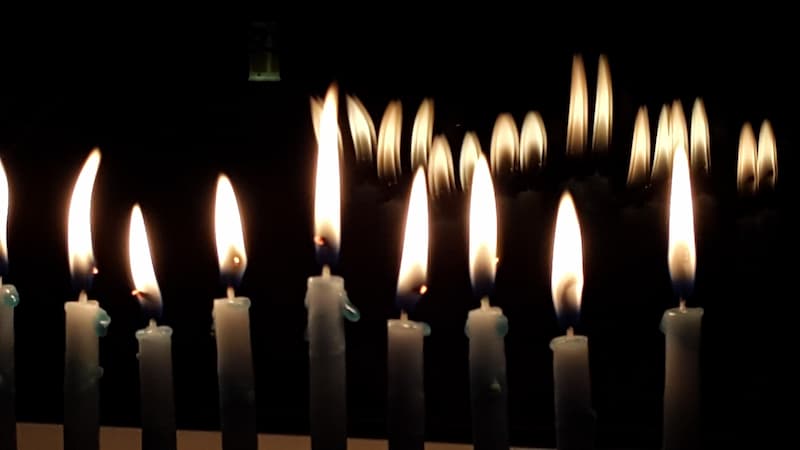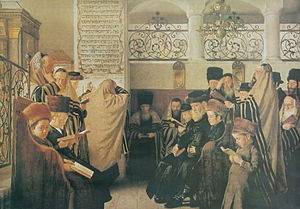Hanukkah is the holiday of miracles. One last jug of oil was found in the Temple, it was enough to light the Menorah for eight days, and a small group of religious, pious men, were able to defeat the mighty armies of the Greek empire. I believe, however, that the true miracle of Hanukkah is that people were willing to rise against the oppressor, which was not really an oppressor. The Greeks had a wonderful culture, steeped in literature, philosophy, and aesthetics. Alexander the Great did not believe in the burned soil tactic, and strove to maintain the practices and traditions of the communities in the vast territories he has conquered, perhaps taking a page from the Persian Empire’s book. The Jews, like other nations in the region, had no apparent reason to rebel against the Greek rule, except that they were not like any other nation. As Paul Johnson explains in his History of the Jewish People, the Greeks never bothered to learn Hebrew or understand the local culture, which in their eyes was inferior and primitive, but the Jews had a rich trove of biblical texts, contemporary teachings, and wisdom literature. The clash, eventually, was about ideology. We tend to think that this ideological battle was between monotheism and paganism, but I think there was something deeper there, an essence of Judaism which we feel and enjoy on a subconscious level, without fully understanding why it does us good. This is where a Jewish man by the name of Abraham comes into the picture.
In 1943, psychologist Abraham Maslow presented his theory of the Hierarchy of Human Needs. Simply presented, those needs are:
- Food, water, warmth, sleep, shelter.
- Security, safety, stability.
- Love and Belonging
- Esteem – the need to be competent and recognized.
- Need for Self-actualization.
The theory was first embraced with enthusiasm, then criticized for lack of empirical data, and then partially restored to its original status. Scholars agree that Maslow was right in his understanding that there are universal human needs and that fulfilling or achieving them grants us happiness. I think that what Maslow understood both intuitively and through research is the secret and power of Judaism. Let us see how those needs are answered by the teachings of the Tanakh.
Food, water, warmth, sleep: the Torah created an extensive network of social justice, meant to ensure that no one would be hungry or homeless. Isaiah emphasizes this message when he speaks of those he considered truly righteous (58:7): “Share your bread with the poor, and bring the destitute into your home, when you see one who lack clothes, give him cover, for you cannot ignore your own flesh.” Most importantly, God Himself is described as “the mighty and revered, who loves the sojourner and provides him with food and clothes” (Deut. 10:17-18).
Security, safety, stability: Safety stems from trust. We need to trust other humans to create a safe and stable society physically, financially, and emotionally. The Torah considers trust and honesty to be such an essential element, that it mentions it twice in the Ten Commandments: Do not utter God’s name in vein, and do not bear false testimony. In Psalm 15, the author answers the question: “who will dwell in the House of God?” by describing a person who is honest and trustworthy. Psychologists agree that one of the essential roles of an omniscient God is to ensure honest behavior and prevent corruption.
Love and Belonging: “Love others as you love yourself,” this is the golden rule which teaches us that we should be in the company of others and love them. In the Ten Commandments, two segments are dedicated to family life. The obvious one is “honor your father and mother”, but Shabbat also revolves around the family and the people in the extended household: “you, your son and daughter, your servants, and the sojourner at your gates.” The Founding Fathers of Judaism are indeed Fathers and Mothers, and the stories of Genesis still come alive around our Shabbat table today, thousands of years later. We analyze and debate family ties, sibling rivalry, and ideal parenting, making the founders of our faith part and parcel of our historical family. Throughout the ages, Jews persevered through exile and persecutions thanks to the amazing structure of the mobile and modular community. Wherever Jews wandered to, the first thing they did was create a community, get a minyan, establish charity funds, schools, and mutual help organizations, thus giving locals, visitors, and exiles, a sense of belonging.
Esteem – the need to be competent and recognized: This is the hidden, but most important element of the golden rule: “Love others as you love yourself!” You must love yourself to love others. It is also the unwritten role of parents to assist in building the self-esteem of their children. Admittedly, it is not an easy task, and at times parents confuse nurturing the child’s talents and abilities with living vicariously through him and forcing him to follow the path they chose for him. It is easier, however, to achieve that goal within the framework of Judaism for two reasons: a) Parents must follow the laws of the Torah and therefore provide their children with physical needs, safety and security, and a loving and supportive environment, which are essential for the sense of security, belonging, and self-esteem. b) Holidays and religious celebrations are dedicated to the family and to the narratives of the bible, especially the Exodus and redemption, in which we are all capable players entrusted with the covenant and with a mission. With these stories and atmosphere, a child is encouraged, even if only subconsciously, to find the greatness in him, to emulate and identify with one of the many biblical heroes, and to become part of the Jewish experience. And let us not forget the amazing educational advice in proverbs (22:6), which alludes to Hanukkah: “Educate [חנוך] your child according to his talents, and it will guide him till old age.”
Need for Self-actualization: This part takes us back to Paul Johnson and his History of the Jewish People. Johnson convincingly argues that the Torah and the Jews introduced the idea of history to the ancient world. Other mythologies and cultures moved in circles of destruction, in which humans competed and fought with gods and with each other, knowing that eventually an apocalypse, a Ragnarök, or an Armageddon, will wipe out humanity. By contrast, Judaism presented a worldview with a direction. The Torah opens with a mythical, ideal, paradise which was lost and must be reclaimed, and continues with the stories of the struggles of individuals and the nation to establish and keep the covenant with God, a covenant whose purpose is to bring peace and harmony to the world: “… nations will come and say, “Come, let us go… to the house of the God of Jacob”… they will hammer their swords into plowshares… nations will not lift up a sword against another nation, and they shall learn war no more.”
Throughout the ages, this overarching goal has driven Jews, even those who did not see themselves as observant or traditional, to spearhead political revolutions and scientific breakthroughs. Their quest, and ours, for self-actualization and a sense of purpose, is assisted by the deep wisdom of biblical books such as Job, Psalms, and Ecclesiastes (Kohelet).
The brave Maccabees who took up arms against the Greek oppressors might not have been familiar with Maslow’s theory, but they knew it intuitively, and understood that the Torah gives them something which no other culture could. The miracle of Hanukkah is that we, their descendants, continue their legacy and keep working together to make this world a better place.
May the light of Hanukkah drive away the darkness in mankind and bring us a step closer to redemption.
ימי חנוכה לשמחה
Sources:
- For example, Dan Ariely in Predictably Irrational, and Jonathan Haidt in The Righteous Mind.









Parashat Behar – Weekday Torah Reading (Moroccan TeAmim)